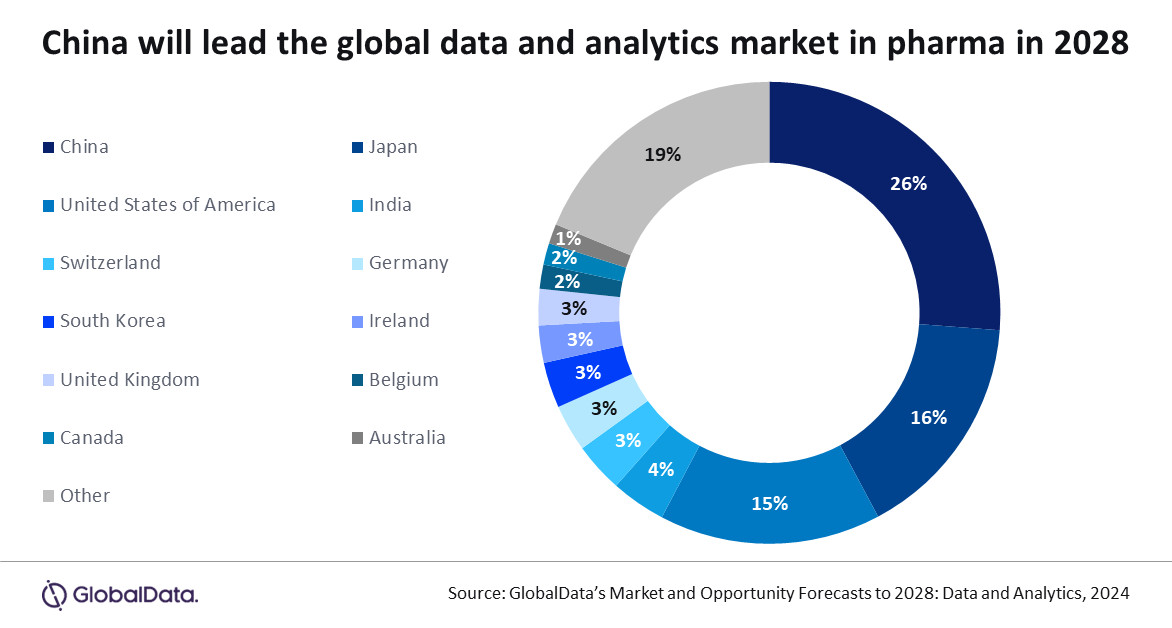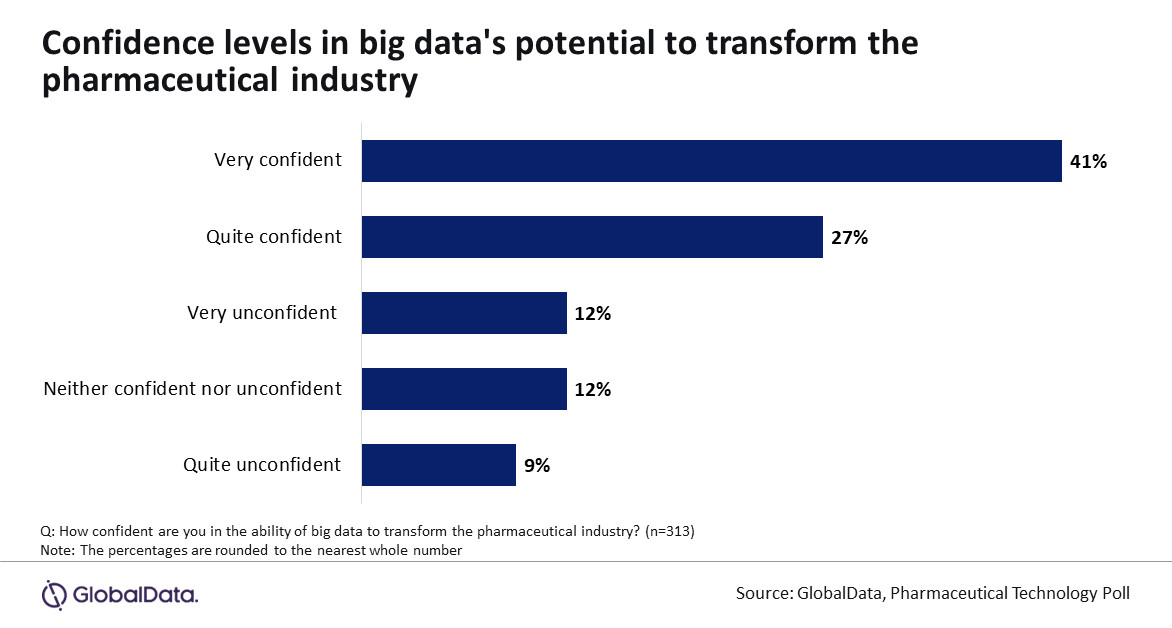China Emerges as a Leader in the Field of Pharmaceutical Data Analytics Amidst Global Market Expansion.
In Brief
The pharmaceutical sector is undergoing a transformation driven by innovations in data analytics, with projections indicating that the market will surge from $1.1 billion in 2022 to $2.1 billion by 2028.

The pharmaceutical landscape is shifting dramatically thanks to advancements in data analytics. Experts predict that the global market for pharmaceutical data and analytics is set to double from its 2022 figure of $1.1 billion to a whopping $2.1 billion by the year 2028, as supported by recent analyses. new GlobalData research This impressive growth, with a compound annual growth rate (CAGR) of 9.5%, reflects the industry’s increasing reliance on big data methodologies, business intelligence frameworks, and sophisticated data and content management systems.
Factors Fueling Market Expansion
The shift towards digitalization within the pharmaceutical industry is generating vast and complex datasets. Sources of this data—ranging from genetic information and clinical trial results to patient demographics and results from empirical studies—are being integrated and analyzed to derive meaningful insights. Consequently, data and content management is becoming an essential tech area to effectively organize and leverage these diverse datasets.
Big data plays a pivotal role in the pharmaceutical realm, as this trend of digitalization opens doors for new innovations and growth, as highlighted by Gaffar Aga, a Strategic Intelligence Analyst at GlobalData.
China’s Influence and Regional Prowess
Within the pharmaceutical sector, China has positioned itself as the front-runner in data analytics. In 2022, it contributed approximately 20.2% to global sales, a figure expected to rise to 25.9% by 2028, demonstrating the nation's swift adoption of advanced data technologies. This dominance stems from substantial R&D investments, government backing for tech advancements, and the growing prominence of the Chinese pharmaceutical market on the world stage.

Photo: GlobalData
This geographic growth aligns with a broader trend where emerging markets leverage data analytics to enhance their efficacy and competitiveness in the pharmaceutical landscape.
Wider Trends in the Global Data and Analytics Arena
The market for pharmaceutical data and analytics is part of a larger framework. GlobalData forecasts that the entire global data and analytics market—spanning all sectors—is likely to grow from $101 billion in 2022 to $190 billion by 2028. This growth underscores the increasing importance of data-driven decision-making across various industries.
The pharmaceutical sector's focus on adopting big data platforms, business intelligence systems, and data discovery tools within such a vast ecosystem illustrates its commitment to harnessing new technologies for improved operational efficiency and innovation.
Several facets of the pharmaceutical value chain are evolving due to the impact of big data. A survey by GlobalData, conducted between July and September 2024, indicated that the two segments of the value chain poised to benefit the most from big data are target discovery as well as preclinical and clinical trials, with 21% and 27% of respondents highlighting these areas, respectively.

Photo: GlobalData
Big data facilitates the identification of potential drug targets and fosters the development of more targeted and effective clinical trials by enabling the analysis of extensive and diverse datasets. These advancements enhance the likelihood of successful outcomes in later stages of drug development, while also streamlining the process.
Confidence in the Revolutionary Impact of Big Data
Findings from GlobalData also reflect a growing enthusiasm regarding the transformative capabilities of big data within the pharmaceutical sector. Based on a survey of 313 professionals conducted from July to September 2024, a notable 68% expressed confidence in big data's potential impact on the industry. In contrast, 11.5% remained neutral, and 20.5% expressed skepticism.
This optimism is driven by a heightened awareness of the benefits big data offers in terms of process optimization, cost savings, and fostering innovation. Nevertheless, the presence of skeptics underscores the pressing need for clear evidence of success stories and tangible results stemming from big data initiatives.
Despite the clear advantages that big data presents for the pharmaceutical industry, there are still significant hurdles to its widespread adoption. Challenges such as data privacy concerns, the complexity of integrating diverse datasets, and the need for advanced analytical skills and tools persist. Addressing these challenges necessitates robust regulatory frameworks, investments in training, and the development of secure and scalable technologies.
Conversely, companies that effectively leverage big data stand to gain tremendous advantages. These potential benefits are groundbreaking, ranging from improved patient outcomes and fostering precision medicine to accelerating the timeline for introducing new drugs into the market.
The Role of Analytics in Shaping the Future of Pharmaceuticals
As the pharmaceutical industry seeks to derive value from vast pools of data, it is becoming increasingly reliant on analytics. Data discovery tools and business intelligence systems are crucial in enabling stakeholders to interpret and comprehend complex information. These technologies pave the way for a more agile and responsive industry by assisting firms in spotting trends, forecasting outcomes, and making informed choices.
The pharmaceutical field stands at the cusp of a revolutionary shift, propelled by the anticipated growth in the global data and analytics market. This commitment to utilizing data for innovation and growth is underscored by the projected market elevation to $2.1 billion by 2028.
However, realizing the full potential of big data will also require collaborative efforts among industry players, proactive investments in talent and technology, and sustained focus on tackling challenges related to data management and integration. By strategically adopting these measures, the pharmaceutical sector could unlock innovations and create new pathways for growth that would benefit patients, healthcare providers, and businesses alike.
The trajectory of the pharmaceutical industry is poised to be significantly influenced by technological advancements and data-centric decision-making, as evidenced by the growing trust in big data’s capabilities and its expanding application throughout the value chain.
Disclaimer
In line with the Trust Project guidelines Please bear in mind that the details provided in this section are not intended as legal, tax, investment, financial, or any other type of advice. It’s crucial to only invest what you can afford to lose, and it’s advisable to seek independent financial counsel should you have any uncertainties. For more information, we recommend reviewing the terms and conditions, as well as the support resources offered by the issuer or advertiser. MetaversePost is dedicated to providing accurate and impartial reporting, though market conditions may fluctuate without prior notice.







